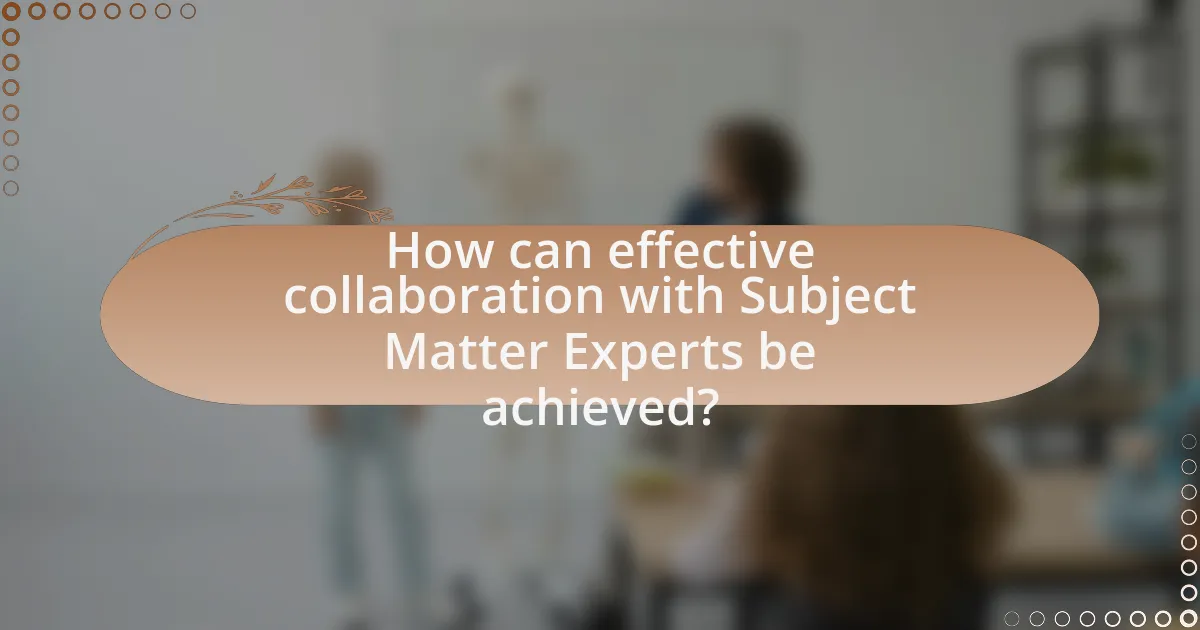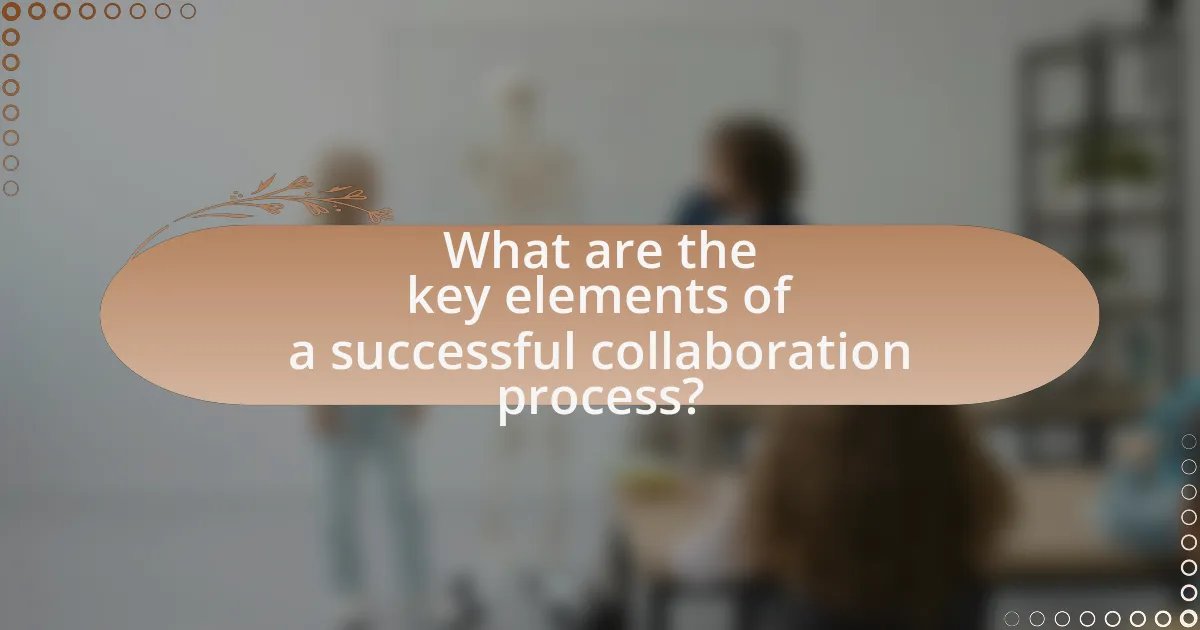The article focuses on best practices for collaborating with Subject Matter Experts (SMEs), emphasizing the importance of clear communication, defined roles, and a collaborative environment. It outlines how effective collaboration with SMEs can enhance project outcomes by leveraging specialized knowledge, improving decision-making, and fostering innovation. The article also addresses common challenges faced during collaboration, such as communication barriers and differing priorities, while providing strategies to overcome these obstacles. Additionally, it highlights the role of technology in facilitating collaboration and offers practical tips for maximizing the contributions of SMEs to achieve successful project results.

What are Best Practices for Collaborating with Subject Matter Experts?
Best practices for collaborating with subject matter experts (SMEs) include establishing clear communication, defining roles and expectations, and fostering a collaborative environment. Clear communication ensures that both parties understand the objectives and requirements of the project, which enhances efficiency. Defining roles and expectations helps to clarify responsibilities, reducing confusion and overlap in tasks. Fostering a collaborative environment encourages open dialogue and idea sharing, which can lead to innovative solutions. Research indicates that effective collaboration with SMEs can improve project outcomes by up to 30%, as noted in studies by the Project Management Institute.
Why is collaboration with Subject Matter Experts important?
Collaboration with Subject Matter Experts (SMEs) is important because it enhances the quality and accuracy of projects by leveraging specialized knowledge. SMEs provide insights that are critical for informed decision-making, ensuring that the content or solutions developed are relevant and effective. For instance, a study by the Project Management Institute found that projects with expert involvement are 20% more likely to succeed, highlighting the tangible benefits of integrating expert knowledge into project workflows.
What roles do Subject Matter Experts play in projects?
Subject Matter Experts (SMEs) play critical roles in projects by providing specialized knowledge and insights that inform decision-making and enhance project outcomes. They contribute to defining project requirements, ensuring accuracy in content, and guiding the development process based on their expertise. For instance, in a software development project, an SME in cybersecurity would ensure that security protocols are integrated effectively, thereby reducing vulnerabilities. Their involvement often leads to improved quality, reduced risks, and increased efficiency, as evidenced by studies showing that projects with active SME participation are 30% more likely to meet their objectives on time and within budget.
How does collaboration enhance project outcomes?
Collaboration enhances project outcomes by leveraging diverse expertise and perspectives, which leads to more innovative solutions and improved decision-making. When team members from various backgrounds work together, they can identify potential challenges and opportunities that a single individual might overlook. Research indicates that collaborative teams are 5 times more likely to achieve high performance compared to those that work in isolation, as highlighted in a study by the Institute for Corporate Productivity. This increased performance is attributed to enhanced communication, shared knowledge, and collective problem-solving, ultimately resulting in higher quality deliverables and more efficient project execution.
What challenges are faced when collaborating with Subject Matter Experts?
Collaborating with Subject Matter Experts (SMEs) presents several challenges, including communication barriers, differing priorities, and time constraints. Communication barriers arise when SMEs use technical jargon that may not be understood by all team members, leading to misunderstandings. Differing priorities can occur as SMEs often have their own responsibilities and may not prioritize collaboration, which can delay project timelines. Time constraints are significant, as SMEs typically have limited availability due to their existing commitments, making it difficult to schedule meetings or obtain timely feedback. These challenges can hinder effective collaboration and impact project outcomes.
What common communication barriers exist?
Common communication barriers include language differences, cultural misunderstandings, and emotional barriers. Language differences can lead to misinterpretation of messages, while cultural misunderstandings may result from varying norms and values that affect communication styles. Emotional barriers, such as fear or mistrust, can hinder open dialogue and collaboration. Research indicates that these barriers can significantly impact teamwork and project outcomes, emphasizing the need for awareness and strategies to mitigate them in professional settings.
How can differing priorities affect collaboration?
Differing priorities can significantly hinder collaboration by creating misalignment among team members. When individuals or groups prioritize different goals, it can lead to conflicts, misunderstandings, and a lack of shared focus, ultimately impeding progress. For instance, a study by Jehn (1995) in the “Academy of Management Journal” found that task conflict, which often arises from differing priorities, can negatively impact team performance if not managed effectively. This misalignment can result in wasted resources and time, as team members may pursue divergent paths rather than working cohesively towards a common objective.

How can effective collaboration with Subject Matter Experts be achieved?
Effective collaboration with Subject Matter Experts (SMEs) can be achieved by establishing clear communication channels and defining roles and expectations upfront. This approach ensures that both parties understand their responsibilities and can share knowledge efficiently. Research indicates that structured collaboration frameworks, such as regular check-ins and feedback loops, enhance the quality of interactions and outcomes. For instance, a study published in the Journal of Knowledge Management found that organizations that implemented systematic collaboration practices with SMEs reported a 30% increase in project success rates.
What strategies promote successful collaboration?
Effective communication is a strategy that promotes successful collaboration. Clear and open dialogue among team members ensures that everyone understands their roles, responsibilities, and the project’s objectives. Research indicates that teams with strong communication practices are 25% more productive than those with poor communication (Harvard Business Review, 2017). Additionally, establishing trust within the team fosters a collaborative environment, as trust encourages sharing of ideas and constructive feedback. A study by the Institute for Corporate Productivity found that organizations with high trust levels experience 50% higher employee engagement, which directly correlates with improved collaboration outcomes.
How can clear objectives be established?
Clear objectives can be established by utilizing the SMART criteria, which stands for Specific, Measurable, Achievable, Relevant, and Time-bound. This framework ensures that objectives are well-defined and actionable, facilitating effective collaboration with subject matter experts. For instance, a specific objective might be to increase user engagement by 20% within six months through targeted content strategies. Research indicates that organizations employing the SMART framework experience a 30% increase in goal achievement compared to those without structured objectives.
What role does active listening play in collaboration?
Active listening is crucial in collaboration as it fosters understanding and builds trust among team members. By actively engaging with others’ perspectives, collaborators can clarify ideas, reduce misunderstandings, and enhance problem-solving. Research indicates that teams that practice active listening are 50% more effective in achieving their goals, as they create an environment where all voices are heard and valued. This approach not only improves communication but also encourages a culture of respect and openness, essential for successful collaboration with subject matter experts.
How can technology facilitate collaboration with Subject Matter Experts?
Technology facilitates collaboration with Subject Matter Experts (SMEs) by providing platforms for real-time communication, document sharing, and project management. Tools such as video conferencing software, collaborative document editing, and project management applications enable SMEs to contribute their expertise efficiently, regardless of geographical barriers. For instance, platforms like Zoom and Microsoft Teams allow for instant communication and brainstorming sessions, while Google Docs enables simultaneous editing and feedback on documents. According to a study by McKinsey, organizations that leverage digital collaboration tools can improve productivity by 20-25%. This demonstrates that technology not only enhances the speed of collaboration but also increases the quality of input from SMEs, leading to more informed decision-making and better project outcomes.
What tools are most effective for communication?
Effective communication tools include email, instant messaging platforms, video conferencing software, and project management tools. Email allows for detailed, asynchronous communication, while instant messaging platforms like Slack facilitate quick, real-time interactions. Video conferencing tools such as Zoom enable face-to-face discussions, enhancing clarity and engagement. Project management tools like Trello or Asana help organize tasks and streamline communication among team members. These tools are validated by their widespread use in professional settings, with studies showing that effective communication can improve team collaboration and productivity by up to 25%.
How can project management software enhance collaboration?
Project management software enhances collaboration by providing a centralized platform for communication, task management, and document sharing among team members. This software facilitates real-time updates and feedback, ensuring that all stakeholders are aligned and informed about project progress. For instance, tools like Asana and Trello allow users to assign tasks, set deadlines, and track completion, which fosters accountability and transparency. According to a study by the Project Management Institute, organizations that utilize project management software report a 20% increase in team collaboration efficiency, demonstrating the effectiveness of these tools in improving collaborative efforts.

What are the key elements of a successful collaboration process?
The key elements of a successful collaboration process include clear communication, defined roles, mutual respect, and shared goals. Clear communication ensures that all participants understand the objectives and expectations, which is essential for effective teamwork. Defined roles help to clarify responsibilities, reducing confusion and enhancing accountability among team members. Mutual respect fosters a positive working environment, encouraging open dialogue and collaboration. Shared goals align the efforts of all participants, driving the team towards a common purpose. Research indicates that teams with these elements are more likely to achieve successful outcomes, as evidenced by a study published in the Journal of Business and Psychology, which found that effective communication and role clarity significantly enhance team performance.
How can trust be built between team members and Subject Matter Experts?
Trust can be built between team members and Subject Matter Experts (SMEs) through open communication and consistent collaboration. Establishing regular check-ins and feedback sessions allows team members to express their needs and concerns, fostering a transparent environment. Research indicates that teams with high levels of communication report increased trust and collaboration, as seen in a study published in the Journal of Business Communication, which found that effective communication practices significantly enhance team dynamics and trust levels. Additionally, recognizing and valuing the expertise of SMEs through acknowledgment and inclusion in decision-making processes further solidifies trust, as it demonstrates respect for their knowledge and contributions.
What practices foster a trusting environment?
Practices that foster a trusting environment include open communication, transparency, and consistent follow-through on commitments. Open communication allows individuals to express their thoughts and concerns freely, which builds rapport and understanding. Transparency in decision-making processes ensures that all parties are aware of the rationale behind actions, reducing suspicion and fostering trust. Consistent follow-through on commitments demonstrates reliability, reinforcing the belief that individuals can depend on one another. Research indicates that organizations with high levels of trust experience increased collaboration and improved performance, highlighting the importance of these practices in creating a supportive environment.
How does transparency contribute to trust?
Transparency contributes to trust by fostering open communication and accountability. When individuals or organizations share information openly, it reduces uncertainty and builds confidence among stakeholders. For instance, a study by the Edelman Trust Barometer found that 81% of respondents stated that they need to trust a brand to buy from them, highlighting the importance of transparency in consumer trust. By providing clear insights into processes, decisions, and intentions, transparency creates an environment where trust can flourish, as stakeholders feel informed and valued.
What methods can be used to evaluate collaboration effectiveness?
Methods to evaluate collaboration effectiveness include surveys, performance metrics, and feedback sessions. Surveys can assess team members’ perceptions of collaboration quality, while performance metrics, such as project completion rates and adherence to deadlines, provide quantitative data on collaboration outcomes. Feedback sessions facilitate open discussions about collaboration experiences, allowing for qualitative insights. Research indicates that organizations employing these methods report improved teamwork and project success rates, highlighting their effectiveness in measuring collaboration.
What metrics should be considered for evaluation?
Key metrics for evaluation in collaboration with Subject Matter Experts (SMEs) include engagement level, knowledge transfer effectiveness, project outcomes, and stakeholder satisfaction. Engagement level can be measured through participation rates in meetings and feedback sessions, indicating how actively SMEs contribute. Knowledge transfer effectiveness can be assessed by evaluating the clarity and applicability of the information shared, often through surveys or assessments post-collaboration. Project outcomes are quantified by the success of deliverables against predefined goals, such as timelines and quality standards. Stakeholder satisfaction is gauged through feedback from team members and clients regarding the collaboration process and results. These metrics provide a comprehensive framework for assessing the effectiveness of collaboration with SMEs.
How can feedback be effectively gathered and utilized?
Feedback can be effectively gathered and utilized by implementing structured methods such as surveys, interviews, and focus groups. These methods allow for the collection of specific, actionable insights from stakeholders, ensuring that the feedback is relevant and targeted. For instance, a study by the American Psychological Association found that structured feedback mechanisms can increase response rates by up to 30%, leading to more comprehensive data collection. Once gathered, feedback should be analyzed systematically to identify trends and areas for improvement, which can then be integrated into decision-making processes. This approach not only enhances collaboration with subject matter experts but also fosters a culture of continuous improvement within organizations.
What are some practical tips for collaborating with Subject Matter Experts?
To effectively collaborate with Subject Matter Experts (SMEs), establish clear communication channels from the outset. This ensures that both parties understand project goals and expectations. Regular check-ins and updates can facilitate ongoing dialogue, allowing for timely feedback and adjustments. Additionally, respect the SME’s time by preparing specific questions and topics for discussion, which can lead to more productive interactions. Providing context about the project and its objectives can also help SMEs contribute more effectively. Research indicates that structured collaboration frameworks enhance the quality of outcomes, as seen in studies by the Project Management Institute, which highlight the importance of clear roles and responsibilities in team dynamics.
How can regular check-ins improve collaboration?
Regular check-ins enhance collaboration by fostering open communication and ensuring alignment among team members. These scheduled interactions allow participants to share updates, address challenges, and clarify expectations, which leads to a more cohesive working environment. Research indicates that teams with regular check-ins experience a 25% increase in productivity due to improved clarity and reduced misunderstandings. By maintaining consistent dialogue, team members can adapt to changes swiftly, ultimately driving project success and enhancing overall collaboration.
What are the best ways to recognize and utilize Subject Matter Experts’ expertise?
The best ways to recognize and utilize Subject Matter Experts’ expertise include actively engaging them in discussions, soliciting their input on relevant projects, and acknowledging their contributions publicly. Engaging experts in discussions allows organizations to tap into their specialized knowledge, while soliciting input ensures that their insights are integrated into decision-making processes. Public acknowledgment of their contributions not only validates their expertise but also encourages ongoing collaboration. Research indicates that organizations that effectively leverage Subject Matter Experts can improve project outcomes by up to 30%, demonstrating the tangible benefits of recognizing and utilizing their expertise.